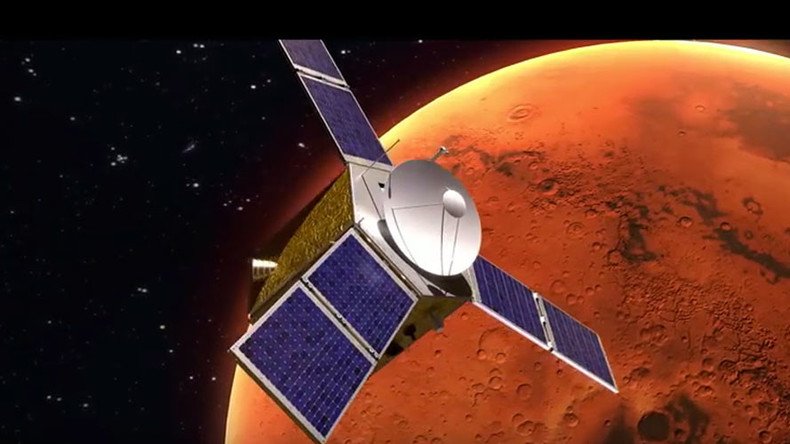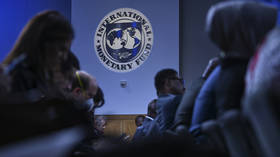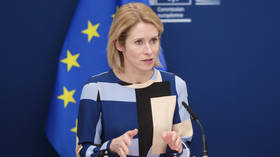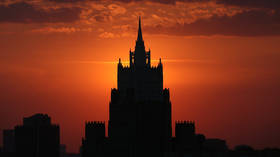UAE launches space program to boost colonization of Mars by 2021

The UAE has launched an ambitious space program aimed at sending a probe to Mars by 2021 and settling the Red Planet by 2117. The kingdom’s rulers see the hi-tech venture as a sign of hope and inspiration for the entire Arab world.
Until recently, only a handful of leading world powers funded and promoted space exploration programs, including the US, Russia, China, Japan and the EU. Other nations, especially those in the Middle East, have long been excluded from global scientific mainstream, but now the United Arab Emirates (UAE) has joined the race.
READ MORE: ‘We’ll settle Mars by 2117’: UAE enters race to put humans on Red Planet (PHOTOS)
On Wednesday, Sheikh Mohammed bin Rashid al-Maktoum, prime minister of the UAE and emir of Dubai, and Mohammed bin Zayed al-Nahyan, crown prince of Abu Dhabi, inaugurated the national space program at the Mohammad Bin Rashid Space Center (MBRSC), local media reported.
Part of the ambitious, far-fetched program is the construction of a first-of-its-kind “scientific city” that would imitate the atmosphere and other conditions on Mars, including zero gravity, according to Khaleej Times. The new facility is also to include “a museum of Mars and specialized laboratories.”
The national space program should give boost to the UAE’s Emirates Mars Mission (EMM) – an ambitious project aimed at making the kingdom the first Arab country to reach Mars by 2021. In February of this year, the UAE’s prime minister said that the EMM is also studying the possibility building the “first inhabitable human settlement” on Mars within the next 100 years, settling the Red Planet by 2117.
Aside from the long-term projects, the UAE’s space program will train astronauts from the Emirates and the Arab world for prospective Mars missions.
Pics: @HHShkMohd & Mohamed bin Zayed review plans & projects during a tour of @MBRSpaceCentre#Dubai#UAEpic.twitter.com/JpfGWczMDd
— Dubai Media Office (@DXBMediaOffice) April 12, 2017
News: @HHShkMohd, Abu Dhabi Crown Prince launch National Space Program https://t.co/YqiMFz8DsZ#UAE#Dubaipic.twitter.com/FqZiqCW7ex
— Dubai Media Office (@DXBMediaOffice) April 12, 2017
“Our national Space program constitutes a solid ground to create Emirati human resources specialized in space science, and aims to rehabilitate a generation that will be able to add to human knowledge,” Sheikh al-Maktoum said at the opening ceremony
He added that the UAE will send its first astronaut to the International Space Station (ISS) within the next few years, becoming the “fastest and more capable country to face such a challenge.”
The country’s scientists are already working on the Mars Hope, an indigenous spacecraft orbiter which is to study the Red Planet’s atmosphere and climate. The mission, expected to be launched in the summer of 2020 and reach Mars in seven to nine months, “will study how the lower and upper layers of the atmosphere interact with each other,” according to the official website.
Major scientific powerhouses are also planning space missions that should reach Mars by 2020. ExoMars, a joint Russia-EU astrobiology project, includes landing a rover on the Martian surface to search for signs of past and present life on the planet. NASA’s Mars 2020 is intended to assess its past habitability, as well as seek for accessible geological materials, while the 2020 Chinese Mars mission will demonstrate Beijing’s technological capacity.
SpaceX, led by exuberant Elon Musk, also wants to send its Dragon 2 capsule to the Red Planet by 2020 to blaze the way for Musk’s mind-boggling plans to colonize Mars. Musk, an avid entrepreneur and innovator, believes that settling the Red Planet is the best way for the humankind to survive if an asteroid, global warming, or a super volcano destroys civilization.
It is yet unclear if the UAE, an oil-rich but tiny country, can catch up. Some officials have indicated that the space program is more of political than scientific importance.
“His Highness Shaikh Mohammad Bin Rashid al-Maktoum mentioned on several occasions that this mission is not about reaching Mars,” the Mars mission’s project manager, Omran Sharaf, told Gulf News.
“It’s beyond that… It’s about taking the whole [Arab] region and making them [Arabs] active in generating knowledge,” he said.













